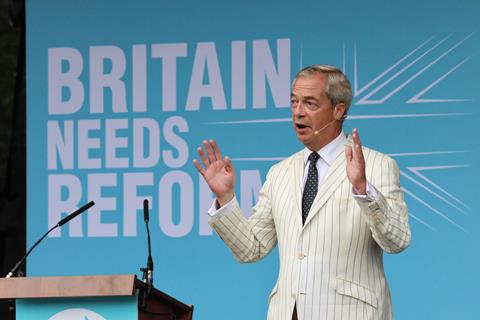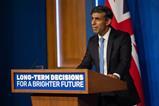Reform UK’s leader Nigel Farage is back in the headlines this week, accused of allegedly making racist remarks while at school. Holly Petersen says Christians must not be fooled by his policies of hostility and division. It goes against everything Jesus commanded

Last week, Home Secretary Shabana Mahmood unveiled a sweeping overhaul of the UK’s asylum system. Under her proposals, refugee status would become temporary, access to housing and financial support would be reduced, and the pathway to permanent residence would stretch to 20 years. If implemented, these changes would strip many refugees of stability and deepen the systemic barriers they face. The proposals are startling - not only for their severity, but for how far Labour now appears willing to go to stop voters switching to Reform UK.
But while Labour chases Reform voters, another question emerges: Who are Reform chasing?
The answer appears to be - us. Reform UK is using explicitly Christian language in an attempt to win Christian voters. For example, in a recent conference speech, Reform leader Nigel Farage spoke about “the Judeo-Christian culture” which “underpins everything that we are”. He also used terms like “Christian forgiveness” when defending colleagues embroiled in scandal. These are not accidental flourishes; they are targeted signals designed to expand the party’s Christian support base.
An unoriginal playbook
We have seen this playbook before.
In the United States, Donald Trump has made appealing to conservative Christians central to his political strategy, promising to defend “Christian America” and posing with a Bible outside a church during national protests. With the benefit of distance, it is easier for us in Britain to see these gestures for what they are: hollow publicity stunts for personal gain. We can see that his character, values - and many of his policies - are routinely contradictory to Christian ethics.
People become less Christ-like when they trade hospitality for hostility
Closer to home, Reform UK is engaging in a similar contradiction. It uses Christian-coded language while promoting policies that dehumanise people fleeing persecution. The party has said that it would leave the European Convention on Human Rights, abolish indefinite leave to remain and has promised mass deportations. These proposals would only increase the suffering of some of the most traumatised people in our society.
This package of hostility is being sold as a programme to improve the quality of life for ordinary people. But migrants are not the reason Britain is struggling. Years of austerity, hollowed-out public services, and a refusal to tackle extreme inequality are driving the cost-of-living crisis. Scapegoating desperate families crossing borders is both morally wrong and economically misleading.
The greatest commandment
When Jesus was asked which commandment mattered most, he said: “Love the Lord your God with all your heart and soul…and love your neighbour as yourself” (Matthew 22:37-39).
He distilled the Christian faith to its essential moral core: love of God, and love of neighbour. So, when a political movement sprinkles Christian jargon on top while urging us to fear our neighbour, resent the stranger or reject the vulnerable, we should find it insulting rather than appealing. It suggests Christians will abandon the core imperatives Jesus gave us the moment someone utters a few familiar words. It assumes our convictions are shallow.
But this is not what Christianity is about. As Jesus warned in Matthew 16:26: “What good will it be for someone to gain the whole world, yet forfeit their soul?”
Reform may claim they want to defend Britain as a Christian nation. Yet the opposite is true. People become less Christ-like when they trade hospitality for hostility, solidarity for scapegoating, and love for fear.
When we close our doors to the stranger, we are closing our hearts to our faith. This is the path by which Britain stops being a Christian country.






































16 Readers' comments